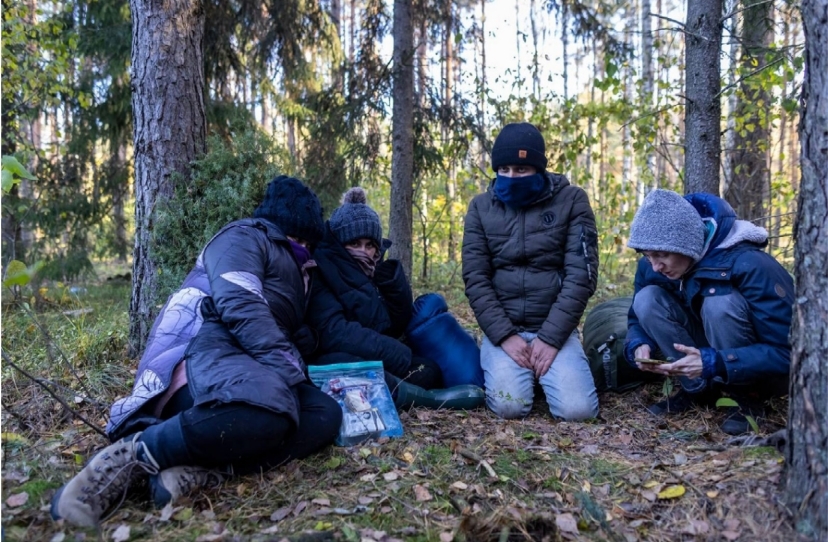Zofia Wlodarczyk
- Research Associate
Context
Thousands of women, children and men are trapped at the Polish-Belarusian border between Belarussian soldiers, barbed-wire fence and Polish border guards with neither of the two countries allowing them in. Refugees and migrants that are being pushed back and forth in between Belarus and Poland come from a wide range of places: Syria, Iraq, Afghanistan, Ethiopia, Somalia, Yemen, Cuba, Turkey, Egypt, Lebanon and more.
The Polish government, European Union, NATO and the USA accuse Alexander Lukashenko, Belarus’ authoritarian leader, of intentionally manufacturing the crisis by loosening restrictions and encouraging refugees and migrants with false promises of a safe passage to Europe via its border. His actions are believed to be a response to EU sanctions imposed on Lukashenko after rigged re-election in 2020 and severe repressions on mass pro-democratic protests that followed.
Poland's Response
In response, Polish parliament passed a new bill legalizing
pushbacks. As Anna Strama, a human-rights lawyer
explains, according to the new legislation when a foreigner
is apprehended immediately after crossing the border, the

Border Guard is not required to initiate any return proceedings, which means they do not need to investigate whether the migrant is at risk for serious harm in case of return to their country of origin. Instead, the Border Guard may deport (send abroad) such persons right after apprehension takes place, additionally banning them from re-entering Poland for a period from 6 months to 3 years. The legislation also allows the Head of the Office of Foreigners to not examine the application for international protection on the merits, when such application is submitted by a foreigner apprehended directly after crossing the border irregularly. Additionally, the new legislation does not provide an effective or reasonable appeal process. Strama argues that the new bill is contrary to international law and the non-refoulement principle which forbids sending potential asylum-seekers to their countries of origin where their lives might be in danger.
The Polish right-wing government also introduced a state of emergency in the border region barring journalists, humanitarian organizations and medics from entering the area. According to the Polish law the state of emergency declaration lasts for a maximum of 90-days. Therefore, the Polish Parliament is working on passing a new law in expedited procedure allowing the Minister of Interior to ban entry into the border region areas.
Testimonials
As the crisis deepens, non-governmental organizations and local people provide support for refugees and migrants trapped in the forest. Ola Gulińska from the Border Group, a cluster of NGOs providing humanitarian aid at the border, says that they help around 800 people a week. Majority of people who receive help, report experiencing multiple pushbacks. Kerem, a 23-year-old from Turkey who left the country with his younger brother and two friends, has spent 27 days in Białowieża Forest, which is the oldest and largest forest in Europe and home to various wild animals. Kerem has been pushed back and forth between Poland and Belarus five times already, each time beaten up or threatened by armed forces on both sides. Similarly, Dani from Yemen was recently taken to a Polish hospital to be treated for his broken leg, which was a result of violence he suffered from Belarussian soldiers. Immediately after being released from the hospital Dani was taken to the Belarusian border by Polish border guards and left alone in the cold dark forest. Pushbacks do not spare women or children. A group of three women from Syria, who escaped war and

gender- based violence in their country, suffered head and eye injuries due to violence by Belarussian soldiers and were turned back by Polish officials and transported back to the border five times. A Kurdish family of eight, including three kids and two elders, were push-backed over ten times and resultingly suffered serious injuries and frostbite. An Iraqi man experienced several pushbacks (approximately twenty); he was not able to remember the exact number. He says he would rather die than be pushed back one more time.
On the 13th of October 2021 a body of a twenty-four-year-old Issa Jerjos was found by a police patrol near the village of Klimówka, 5 kilometers (3 miles) from the border with Belarus. A couple weeks earlier Issa was admitted to a Polish hospital, but right after being discharged, he was pushed back to Belarus. Eleven more people have been found dead at the border. In reality the number of people who’ve died at the border is much higher and will unfortunately grow as the temperatures fall in December.
Recommendations
The UNHCR has urged Poland and Belarus, who have both signed the 1951 Refugee Convention, to comply with their international obligations. According to the Convention, the regularity of arrival of an asylum seeker to a country does not determine their right to seek asylum since asylum-seekers are frequently forced to enter a territory without earlier authorization. Returning people to the border is a violation of human rights and is against international law that grants international protection for people fleeing violence, persecution, or war.
In addition, humanitarian organizations call on the Polish government to create a humanitarian corridor, provide access to the restricted zone for media representatives, humanitarian aid organizations and medical help.
Author Zofia Włodarczyk is a doctoral student in the Department of Sociology with designated emphasis in Human Rights whose research focuses on the experiences of female refugees fleeing domestic violence in the time of political conflict.
Joanna Regulska is the vice provost and dean of Global Affairs at the University of California, Davis, where she also is a professor of gender, sexuality and women’s studies.
Photographs are by Wojtek Radwański